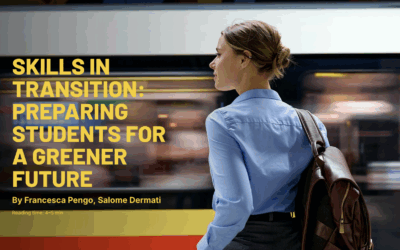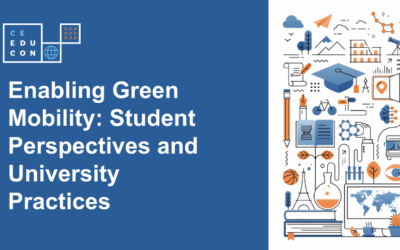The SET project team is happy to announce the publication of its desk research to the EAIE 2025 Winter Forum 2025 on Skill-building for the future! Francesca Pengo and Salome Dermati, EUF, co-authored an article titled “Skills in Transition: Preparing Students for a Greener Future”.
The project in a nutshell
The real long-term aspiration of the SET project is the improvement of students’ opportunities to engage in more environmentally sustainable habits during their mobility and the mindset change regarding the trip to the mobility destination as a transformative experience in itself.
Read more
The SET project was designed to address the three following objectives:
- Support the ongoing transition to a more environmentally sustainable Erasmus+ programme by researching the main features and reasoning behind students’ choices of transport to go on mobility;
- Through the platform for the Sustainable Erasmus Travel, contribute to changing the narrative and promoting the journey to the Erasmus+ mobility as an educative and transformative experience to explore more European countries and enjoy the European citizenship to the fullest;
- Recognise and visualise the added value of green travel by developing a prototype to recognise green soft skills.
This will be achieved by analysing the travel patterns of students, including the implementation and use of the green top up, and assessing what tips the balance for students to use more sustainable means of transport. Secondly, we will set up an online competition for students to showcase the experience of their journey to and from their mobility destination through more sustainable modes of transport. Thirdly, we will produce a digital repository of green competencies gained when travelling sustainably and create a framework for the recognition of such skills. Finally, we will focus on the broad dissemination of the project results and their translation into concrete policy recommendations for Erasmus+ programme stakeholders. Overall, we seek to reach 1.5M students and 500 higher education staff across Europe.
The results of the project will have a long-lasting effect in the European Higher Education Area (EHEA), as they will serve as the basis for policies on the environmental sustainability of Erasmus+ mobilities. We will contribute to recommendations to minimise the carbon footprint of Erasmus+, a significant part of which includes physical mobility, through:
- The recognition of what the tipping point for students is to choose more environmentally friendly modes of transport to go on mobility;
- The analysis of the travel habits of HEIs students, as compared with the implementation of the green top up;
- The launch of an online competition in the Platform for the Sustainable Erasmus Travel to entice students to travel through more sustainable means of transport. Likewise, this will ensure an acknowledgment of the opportunity a slower journey to mobility represents;
- The demonstration and validation of the learning outcomes achieved through green mobility and their link to future employability.”
Travel Patterns of Students
The main features and reasoning behind students’ choices of transport to go on mobility.
We will develop several informational figures depicting the main Erasmus+ travel destinations and highlighting the environmental impact of the main travel modes (airplane, train, coach, car). This knowledge is generated thanks to a quantitative analysis of the travel patterns of previously mobile students and the organisation of focus groups with students, in order to understand the perceived added value and the constraints of more sustainable modes of transport and validate assumptions on what is needed for students to choose more sustainable modes of transportation for their Erasmus+ mobility.
Sustainable Erasmus Journey
The journey to your Erasmus+ mobility as an educative and transformative experience.
We will emphasise the benefits and perks of slow travel to the host city as a learning experience by itself. We consider that a mobility experience is not just about what happens at the destination, but also the journey to get there and the return home. The Sustainable Erasmus Travel campaign will be designed to set up the necessary steps to reach students and incentivise them to travel sustainably by making the journey an experience in itself. We will draft communication guidelines to effectively present the journey and disseminate the campaign, and organise a webinar delivered by the “sustainable travellers” once they complete the journey so they can motivate and inspire their peer student community to travel sustainably for their next Erasmus.
Green Competencies
Digital repository and a prototype to recognise green soft skills.
We will determine the soft skills and competencies learnt, acquired, and applied by students when travelling sustainably for their mobility. We will explore and critically reflect on different classifications, concepts, and variables, in order to identify common patterns, synergies or gaps and present an updated, comprehensive catalogue of skills that respond to the unique experience of travelling to and from your Erasmus+ destination. Our findings will then be assessed through round table discussions with students and academics who work on recognition of skills.
News
Presenting the SET results at CEEDUCON 2025
The 7th edition of the CEEDUCON conference took place in November, gathering over a thousand participants from Higher Education. In the “Smart & Sustainable International Cooperation” thematic area, the SET consortium proudly held a panel on “Enabling Green Mobility: Student Perspectives and University Practices”.
Meeting the first SET green storytellers!
The first Green Storyteller Webinar was held on 24th November to explore how the SET project promotes greener journeys and to highlight the importance of sustainable travel choices for Erasmus+ students.
Timeline

July
2024
Student focus groups & survey

November
2024
Roundtables on green soft skills

May
2025
Conference for stakeholders

October
2025
Launch of the Sustainable Erasmus Journey platform

November
2025
Informational figures on students’ travel patterns

February
2026
Supporting material for mobile students

April
2026
Green Traveller Label & certification tools

April
2026
Final conference

May
2026
Policy recommendations
Sustainable Travel
The European Green Deal, introduced in 2019, is the flagship initiative of the European Union that proposes a comprehensive policy catalogue with a view to reconciling our response to the threats of ecological disruption with opportunities for economic growth and social equality. In the education sector, the 2022 Council Recommendation on learning for the green transition and sustainable development demonstrated the integral role of education in providing information, solutions, and inspiration for individual and collective transformation. However, have policy makers realised the full potential of the Erasmus+ programme in the green transition, especially in the development of green skills amongst young people? And what strategies have been rolled out to minimise the carbon footprint generated from student mobility within the framework of the programme?
Resources
Green competences
Green competences repository: interactive visual – see the interactive repository embedded below or go to the linked app
Green competences repository (pdf) – read the repository as a pdf
Report of green competences repository
Green skills and the future of employability: Aligning higher education with labour market demands
Sustainable Erasmus journey
SET Journey Contest – round 2 coming in November!
Student Travel Insights: facts, smart tools, & routes
Sustainable Erasmus+ Travel Factsheets – See environmental impact and travel time on different
travel modes for the five main routes taken from then popular Erasmus+ destinations. Create your own factsheets by using our modular template and build upon our graphs and maps.
SET Connectivity reports – Have a look at connections and possible stop overs from Porto, Prague, Zurich.
Environmental sustainability in Erasmus+ student mobility: SET survey analysis
Policy recommendations and other documents
Partners
European University Foundation
University of Porto
University of Zurich
Charles University
Erasmus Student Network
Associate Partners
Generation Climate Europe

Contact us
project coordinator
salome.dermati@uni-foundation.eu
Follow #SustainableErasmusTravel





